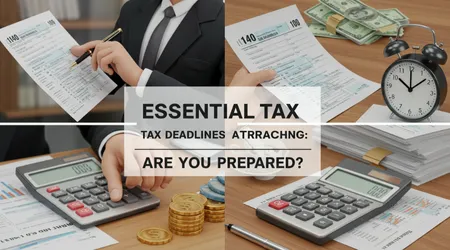Essential Tax Deadlines Approaching: Are You Prepared?

The essential tax deadlines approaching in 2025 are not just dates on a calendar they’re critical moments that can shape your financial health.
For UK taxpayers, whether self-employed, business owners, or employees with side hustles, these deadlines demand attention.
Missing them risks penalties, interest charges, and unnecessary stress. With the 2024/25 tax year nearing its close, now is the time to act.
According to HMRC, 5.4 million people had yet to file their 2023/24 tax returns by mid-January 2025, a stark reminder of procrastination’s cost.
This article unpacks the essential tax deadlines approaching, offering practical strategies to stay compliant, save money, and reduce stress.
From Self Assessment to VAT and pension contributions, we’ll guide you through what’s at stake and how to prepare. Are you ready to take control of your finances?
The UK tax system, while complex, rewards those who plan ahead.
The essential tax deadlines approaching are not just about compliance they’re opportunities to optimise your financial strategy.
For instance, maximising your ISA allowance or making pension contributions before April can yield significant tax relief.
This guide is crafted for clarity, cutting through jargon to deliver actionable advice.
We’ll explore key deadlines, share real-world examples, and highlight lesser-known tips to ensure you’re not caught off guard.
Whether you’re a freelancer juggling multiple gigs or a small business owner navigating VAT, staying ahead of these deadlines is non-negotiable.
Let’s dive into the specifics, so you can face 2025 with confidence.
Why Tax Deadlines Matter More Than Ever in 2025
Tax deadlines aren’t just bureaucratic hurdles; they’re pivotal for financial stability. The essential tax deadlines approaching carry heavier consequences in 2025 due to HMRC’s stricter enforcement.
Late Self Assessment filings incur a £100 penalty, escalating with time.
For businesses, missing VAT deadlines triggers surcharges, impacting cash flow. Compliance ensures you avoid these traps and focus on growth.
Consider Sarah, a freelance graphic designer. Last year, she missed the 31 January Self Assessment deadline, incurring a £100 fine and 3% interest.
By organising her records early this year, she avoided penalties and claimed £2,000 in allowable expenses. Proactivity pays off.
The essential tax deadlines approaching are your chance to emulate Sarah’s success and sidestep costly mistakes.
Moreover, 2025 brings changes like increased National Insurance rates (from 13.8% to 15% for employers), announced in the 2024 Autumn Budget.
These shifts make timely planning critical. Ignoring the essential tax deadlines approaching could mean missing tax relief opportunities, like pension contributions, which must be made by 5 April to qualify for 2024/25 relief.
++ Interest Rate Hikes: What Savers and Borrowers Need to Know Right Now
Stay ahead to protect your finances.
The stakes extend beyond penalties. Late filings signal disorganisation to HMRC, potentially triggering audits.
For small businesses, this can disrupt operations. By marking the essential tax deadlines approaching in your calendar, you signal control, freeing mental space for strategic decisions.
Think of tax deadlines like a train schedule miss one, and you’re scrambling for the next.

Key Tax Deadlines for Individuals in 2025
For individuals, the essential tax deadlines approaching centre on Self Assessment and personal tax planning.
The 31 January 2026 deadline for online 2024/25 tax returns is critical. Late submissions face a £100 penalty, with further charges after three months. File early to avoid stress and secure refunds faster.
If you’re self-employed, payments on account are due 31 January and 31 July 2025. These cover half your estimated tax bill.
Also read: Inflation in the UK: Trends and Government Response in 2025
For example, Tom, a plumber, underestimated his 2024 earnings, leading to a £1,200 balancing payment. Reviewing income regularly helps avoid such surprises.
The essential tax deadlines approaching demand proactive budgeting.
Pension contributions also have a hard deadline: 5 April 2025. Contributions made by this date qualify for 2024/25 tax relief, potentially boosting your retirement savings.
Additionally, voluntary National Insurance contributions for gaps from 2006–2016 must be made by 5 April. After this, only the last six years qualify, limiting state pension boosts.
Another overlooked deadline is 14 February 2025, for requesting a deferral of Class 1 NIC if employed. Missing this risks complications, especially if your employer disagrees.
The essential tax deadlines approaching aren’t just about paying tax they’re about seizing tax-efficient opportunities before windows close.
| Deadline | Action | Consequence of Missing |
|---|---|---|
| 14 February 2025 | Request Class 1 NIC deferral | Employer approval needed post-date |
| 5 April 2025 | Pension contributions for 2024/25 tax relief | Loss of tax relief for the year |
| 31 January 2026 | Online Self Assessment filing | £100 penalty, escalating over time |
| 31 July 2025 | Second payment on account | Interest on underpayments |
Business Tax Deadlines: Staying Compliant
Businesses face a web of essential tax deadlines approaching, from VAT to Corporation Tax.
VAT-registered firms must file quarterly returns, with payments due one month and seven days after the period ends.
For the quarter ending 31 March 2025, the deadline is 7 May 2025. Late filings trigger surcharges.
Corporation Tax deadlines depend on your accounting period. Payments are due nine months and one day after, and returns within 12 months.
Read more: Post-Brexit Tourism and ETA Requirements
For a 31 March 2025 year-end, payment is due 1 January 2026. Missing these risks penalties up to £1,500. The essential tax deadlines approaching demand meticulous record-keeping.
Employers must submit PAYE and NIC payments by the 22nd of each month (19th if by post). For March 2025, payments are due 22 April.
Late submissions invite penalties. Using payroll software, like Sage, streamlines compliance, saving time for strategic tasks.
The Construction Industry Scheme (CIS) also imposes monthly return deadlines, typically the 19th. For April 2025, this is 19 May.
Non-compliance can halt operations. The essential tax deadlines approaching are like cogs in a machine miss one, and the whole system falters. Invest in automation to stay on track.
Small businesses should also note the 19 April 2025 deadline for the final Full Payment Submission (FPS) for the 2024/25 tax year.
This ensures accurate employee tax records. By prioritising these deadlines, businesses can avoid HMRC scrutiny and maintain cash flow stability.
Tax-Saving Opportunities Before Deadlines
The essential tax deadlines approaching aren’t just about compliance they’re gateways to tax efficiency.
Maximising your £20,000 ISA allowance by 5 April 2025 shields investments from capital gains tax.
Similarly, pension contributions before this date can reduce your taxable income significantly.
For businesses, capital allowances let you deduct equipment costs from profits. Purchasing before 31 March 2025 maximises 2024/25 relief.
Consider a café owner buying a £10,000 espresso machine claiming full relief could save £1,900 in Corporation Tax. The essential tax deadlines approaching are your last chance to act.
Self-employed individuals can review allowable expenses, like travel or home office costs, to lower tax bills. Keeping digital records via MTD-compliant software ensures accuracy.
These strategies turn deadlines into opportunities, but only if you act before windows close.
Another tactic is gifting assets within the £3,000 annual CGT exemption before 5 April 2025. This reduces future tax liabilities without triggering charges.
The essential tax deadlines approaching are like a financial spring clean clear out inefficiencies before the new tax year begins.
For families, contributing up to £9,000 to a Junior ISA by 5 April 2025 offers tax-free savings for children.
This long-term strategy leverages compound growth, making deadlines a catalyst for future wealth. Proactive planning transforms tax obligations into financial wins.
Navigating HMRC Changes in 2025

HMRC’s 2025 updates add urgency to the essential tax deadlines approaching. The employer NIC rate increase to 15% from 6 April 2025 raises payroll costs.
Businesses must budget now to avoid cash flow strain. Reviewing payroll liabilities early is critical.
Making Tax Digital (MTD) continues to shape compliance. Businesses must use MTD-compatible software for VAT and maintain digital records. Non-compliance risks penalties.
Investing in tools like ExpenseIn ensures audit-ready records, simplifying adherence to the essential tax deadlines approaching.
HMRC’s push for paperless communication via its app also affects taxpayers. Opting in reduces missed deadlines.
For example, a freelancer using the app received timely reminders, avoiding a £100 penalty. Staying tech-savvy keeps you ahead of regulatory shifts.
The Capital Goods Scheme for VAT on assets like buildings is also simplified in 2025, reducing admin for small firms.
Understanding these changes before the essential tax deadlines approaching lets you adapt proactively, ensuring compliance without last-minute scrambles.
Practical Tips to Stay Ahead
Preparation is your best defence against the essential tax deadlines approaching. Start by organising records digitally use apps like QuickBooks for real-time tracking.
Set calendar reminders for key dates, like 31 January 2026, to avoid penalties.
Engage an accountant if tax complexities overwhelm you. They can identify reliefs, like R&D tax credits, saving thousands.
For instance, a tech startup claimed £15,000 by working with a professional. The essential tax deadlines approaching are easier with expert support.
Regularly review your income and expenses. This prevents surprises, like underpaying payments on account.
Budget for tax bills monthly to ease cash flow pressure. Small, consistent steps ensure you’re ready when deadlines hit.
Finally, use HMRC’s online tools, like its tax calculator, to estimate liabilities. This clarity empowers confident planning.
The essential tax deadlines approaching are manageable with discipline, turning potential stress into a structured process.
Conclusion: Take Control of Your Tax Future
The essential tax deadlines approaching in 2025 are more than administrative tasks they’re opportunities to secure your financial future.
By acting now, you avoid penalties, unlock tax reliefs, and gain peace of mind. From Self Assessment to VAT, each deadline is a chance to optimise.
Don’t let procrastination cost you 5.4 million late filers in 2024 paid the price. Use digital tools, consult professionals, and plan strategically.
Like a ship navigating stormy seas, preparation steers you to calm waters. Take charge today, and make 2025 the year you master your taxes.
This isn’t just about meeting deadlines; it’s about building financial resilience. Review your records, maximise allowances, and stay informed about HMRC changes.
The essential tax deadlines approaching are your roadmap to smarter money management. Why wait to take control? Start now, and turn tax season into a triumph.
Frequently Asked Questions
Q: What happens if I miss the 31 January 2026 Self Assessment deadline?
A: You’ll face a £100 penalty, with additional charges after three months, plus interest on unpaid tax from 1 February 2025.
Q: Can I still make pension contributions for 2024/25 after 5 April 2025?
A: No, contributions after this date apply to the 2025/26 tax year, losing 2024/25 tax relief eligibility.
Q: How can I avoid VAT penalties?
A: File returns and pay by deadlines (e.g., 7 May 2025 for Q1). Use MTD-compliant software for accuracy.
Q: Are there tax-saving options for families?
A: Yes, contribute up to £9,000 to a Junior ISA by 5 April 2025 for tax-free savings, or £3,600 to a child’s pension.
